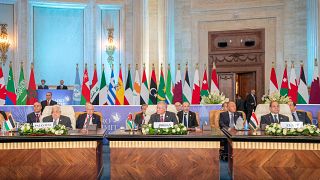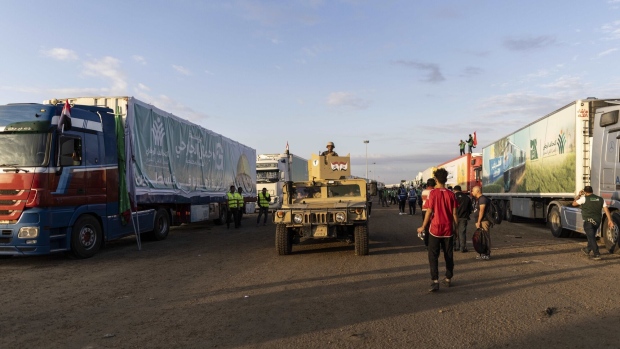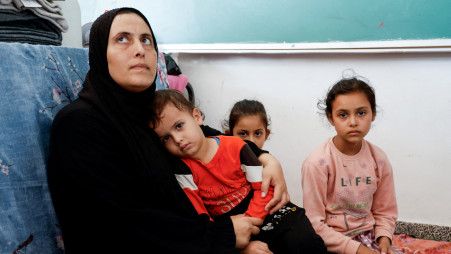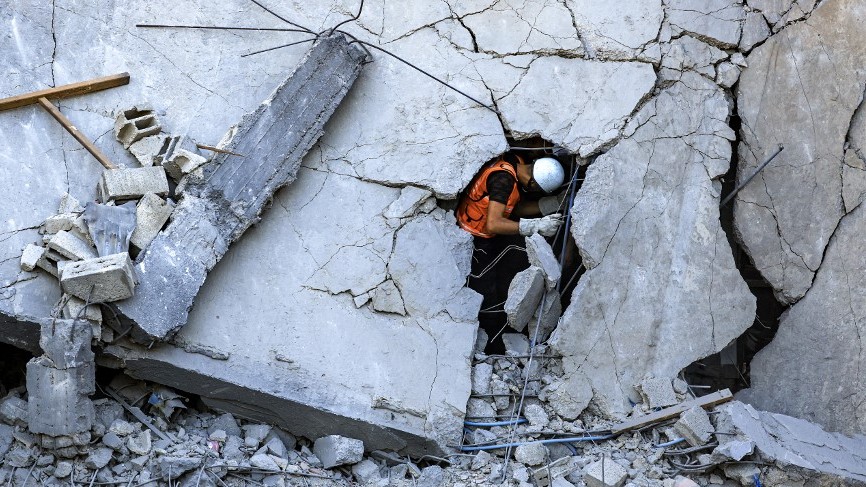AP |
Oct 22, 2023
Egyptian President who hosted the summit rejected any talk of driving Gaza's 2.3 million Palestinians into the Sinai Peninsula.
Egypt and Jordan harshly criticised Israel over its actions in Gaza at a summit on Saturday, a sign that the two Western allies that made peace with Israel decades ago are losing patience with its two-week-old war against Hamas.

Egyptian President Abdel Fattah el-Sissi, who hosted the summit, again rejected any talk of driving Gaza's 2.3 million Palestinians into the Sinai Peninsula and warned against the “liquidation of the Palestinian cause".
Jordan's King Abdullah II called Israel's siege and bombardment of Gaza “a war crime”.
The speeches reflected growing anger in the region, even among those with close ties to Israel who have often worked as mediators, as the war sparked by a massive Hamas attack enters a third week with casualties mounting and no end in sight.
Egypt is especially concerned about a massive influx of Palestinians crossing into its territory, something that it fears would, among other things, severely undermine hopes for a Palestinian state. Vague remarks by some Israeli politicians and military officials suggesting people leave Gaza have alarmed Israel's neighbours, as have Israeli orders for Palestinian civilians to evacuate to the south, toward Egypt.
In his opening remarks, el-Sissi said Egypt vehemently rejected “the forced displacement of the Palestinians and their transfer to Egyptian lands in Sinai”.
“I want to state it clearly and unequivocally to the world that the liquidation of the Palestinian cause without a just solution is beyond the realm of possibility, and in any case, it will never happen at the expense of Egypt, absolutely not,” he said.
Jordan's king delivered the same message, expressing his “unequivocal rejection” of any displacement of Palestinians. Jordan already hosts the largest number of displaced Palestinians from previous Mideast wars.
“This is a war crime according to international law, and a red line for all of us,” he told the summit.
Israel says it is determined to destroy Gaza's Hamas rulers but has said little about its endgame.
On Friday, Israeli Defense Minister Yoav Gallant laid out a three-stage plan in which airstrikes and “maneuvering” — a presumed reference to a ground attack — would aim to root out Hamas before a period of lower intensity mop-up operations.
Then, a new “security regime” would be created in Gaza along with “the removal of Israel's responsibility for life in the Gaza Strip”, Gallant said.
He did not say who would run Gaza after Hamas.
Meanwhile, Israel has ordered more than half of the 2.3 million Palestinians in Gaza to evacuate from north to south within the territory it has completely sealed off, effectively pushing hundreds of thousands of Palestinians toward the Egyptian border.
Amos Gilad, a former Israeli defense official, said Israel's ambiguity on the matter is endangering crucial ties with Egypt. “I think a peace treaty with Egypt is highly important, highly crucial for the national security of Israel and Egypt and the whole structure of peace in the world,” he said.
Gilad said Prime Minister Benjamin Netanyahu needs to speak directly with the leaders of Egypt and Jordan, and say publicly that Palestinians will not be entering their countries.
Two senior Egyptian officials said relations with Israel have reached a boiling point.
They said Egypt has conveyed its frustration over Israeli comments about displacement to the United States, which brokered Camp David Accords in the 1970s. Both officials spoke on condition of anonymity because they were not authorised to brief the media.
Egypt worries that a mass exodus would risk bringing militants into Sinai, from where they might launch attacks on Israel, endangering the peace treaty.
Arab countries also fear a repeat of the mass exodus of Palestinians from what is now Israel before and during the 1948 war surrounding its creation, when some 700,000 fled or were driven out, an event Palestinians refer to as the Nakba, or catastrophe. Those refugees and their descendants, who now number nearly 6 million, were never allowed to return.
At Saturday's gathering, the anger extended beyond the fears of mass displacement.
Both leaders condemned Israel's air campaign in Gaza, which has killed more than 4,300 Palestinians, including many civilians, according to health authorities in Gaza. Israel says it is only striking Hamas targets and is abiding by international law.
The war was sparked by a wide-ranging Hamas incursion into southern Israel on October 7 in which over 1,400 people were killed, the vast majority of them civilians.
Abdullah, who is among the closest Western allies in the region, accused Israel of “collective punishment of a besieged and helpless people".
"It is a flagrant violation of international humanitarian law. It is a war crime,” he said.
He went on to accuse the international community of ignoring Palestinian suffering, saying it had sent a “loud and clear message” to the Arab world that “Palestinian lives matter less than Israeli ones”

By Euronews with AFP
The meeting has representatives from across the globe - including Mahmoud Abbas, the President of the State of Palestine - but Israel are not in attendance.
Gathered "for peace" in Cairo, world leaders demanded on Saturday a "ceasefire" between Israel and Hamas, pleading for "massive" aid to Gaza and a definitive "solution" to 75 years of Israeli-Palestinian conflict.
“We must act now to end the nightmare,” UN boss Antonio Guterres said, speaking as more than 1,400 Israelis have been killed and 200 taken hostage in Israel by Hamas since its deadly attack on 7 October 7.
Nearly 4,400 Palestinians have been killed by Israeli reprisals in Gaza, according to the Health Ministry of Hama.
The Gaza Strip, now under "complete siege" by Israel, "needs a massive delivery of aid", added the Secretary General of the United Nations.
On Saturday, only 20 aid trucks passed from Egypt towards the Gaza Strip.
The UN says at least 100 trucks per day are needed for the 2.4 million Gazans deprived of food, fuel and other necessities.
Guterres launched his plea in front of the heads of state of Egypt, Jordan, the Palestinian Authority, as well as an audience of Arab and European heads of diplomacy, including the bosses of the Arab League, the African Union and the European Union.
Russia, China, Japan, Canada, the UK and the United States were also represented.
Also at the summit, King Abdullah II of Jordan called for "an immediate ceasefire", while Egyptian President Abdel Fattah al-Sisi affirmed that "the only solution to the Palestinian question is justice", emphasising the "right" of the Palestinians "to establish their State".
Pedro Sanchez, the Prime Minister of Spain, urged the international community “not to let the conflict become a regional crisis”.
“We cannot postpone a solution,” Sanchez urged.
Guterres also touched on "the broader context", referring to "56 years of occupation with no end in sight".
“Nothing can justify the reprehensible attack by Hamas” which must, he continued, “immediately and unconditionally release” the approximately 200 hostages it kidnapped in Israel.
Mahmoud Abbas, the President of the Palestinian Authority, called for "the end of the occupation of the Palestinian Territories by Israel and the two-state solution".
Israel is not represented at the summit, but Abbas repeated “we will not leave” three times in response to the Israeli order to evacuate Palestinians from the north of the Gaza Strip to the southern border of the Gaza Strip.
Palestinians see it as a first step towards "a forced displacement" of their people towards the Egyptian Sinai which would, according to Mr. Abbas, amount to "a second Nakba" - meaning ‘catastrophe’ in Arabic - a reference to the expulsion of around 760,000 Palestinians to the creation of Israel in 1948.
King Abdullah II of Jordan openly criticised the global community for their apparent lack of input.
“The world is silent”, he said, adding, “this is a very dangerous message. The Arab world hears it clearly: Palestinian lives are worth less than Israeli lives. Our lives are worth less than other lives… human rights have limits: they stop at borders, races and religions.
Egypt, the host of the summit, wants to be on the diplomatic front line on the Israeli-Palestinian conflict.
They were the first Arab country to sign peace with Israel in 1979 and Cairo has long been a traditional mediator between Israel and the Palestinians - notably Hamas.
Egypt also controls the Rafah crossing point, the only border with Gaza which is not not in the hands of Israel
Egypt’s Gaza Summit Starts With Arab Call for Two-State Solution
, Bloomberg News

(Bloomberg) -- Arab leaders dubbed Israel’s retaliatory strikes on Gaza “collective punishment” as they and some European officials stressed that a stable and secure outcome to the Israel-Palestinian conflict must be built on a two-state solution.
The comments Saturday came during the first session of what was billed by Egypt as the Cairo Peace Summit, a gathering that aims to find ways to prevent the Israel-Hamas conflict, now entering its third week, from widening.
Arab presidents and royalty plus top officials from the Middle East, Europe and Asia as well as Canada and Brazil were on hand. The US and Israel weren’t present.
In initial remarks, Egyptian President Abdel-Fattah El-Sisi rejected the option of displacing Palestinians from Gaza. Jordan’s King Abdullah assessed that the message Arabs are taking on board, amid a ramped-up Israeli bombing campaign on Gaza, is that Palestinian lives matter less than Israeli ones.
Read more: Aid Gets to Gaza for First Time Since Israel-Hamas War Began
The Israeli response to the the Oct. 7 attack has killed thousands in Gaza and left hundreds of thousands of people homeless. It came in response to the killing by Hamas militants of an estimated 1,400 Israelis, mostly civilians, with hundreds more Israelis taken hostage and still unaccounted for. Israel’s defense forces are widely expected to launch a ground war in Gaza any day.
Leadership in Israel must realize that continued violence will not bring about peace and that millions of Palestinians can’t remain in the current circumstances, Jordan’s king said.
Saturday’s gathering came as a trickle of aid was allowed through Egypt’s Rafah border crossing with Gaza. Some 20 trucks carrying food and medical supplies made it through as Gaza’s sole border with Egypt was opened for the first time since the Oct. 7 attacks.
It’s unclear if anything new will emerge from the meeting to address what many in the region, and in Europe, see as the root cause of the continued violence – the lack of progress on securing an equitable two-state solution for Israel and Palestine.
Read more: The US and Israel Weigh a Future for Gaza Without Hamas
United Nations Secretary General Antonio Guterres called demands by Palestinians just and legitimate, even as he said that there was nothing that could justify Hamas’s attacks on Israel this month. Both Israelis and Palestinians need to see their legitimate aspirations realized, he said.
For now, Guterres urged a “humanitarian cease-fire” and “action to end this godawful nightmare.”
What’s critical now is “the need to make every effort to move towards a lasting solution, one that must be based on the two-state solution,” EU President Charles Michel told the summit.
Palestinian President Mahmoud Abbas called for the immediate release of hostages taken during the conflict. He emphasized that Palestinians wouldn’t capitulate on their desire for a homeland.
“We will not leave, not leave,” Abbas said. “We will remain on our land.”
While condemning Oct. 7 attacks, meeting participants said the entire Palestinian population in Gaza shouldn’t be held responsible for the actions of Hamas, deemed a terrorist group by the EU and the US.
“What we need now is to protect all civilians,” said Spanish Prime Minister Pedro Sanchez, who called for “bold” action without laying out specific steps.
Greek Prime Minister Kyriakos Mitsotakis added that “no military intervention can replace a viable political solution.”
--With assistance from Abdel Latif Wahba and Mirette Magdy.
(Updates with Michel comment in 11th paragraph.)
©2023 Bloomberg L.P.
Denying Population Essential Services is Collective Punishment, a War Crime
HUMAN RIGHTS WATCH
October 21, 2023
(Jerusalem) – Israeli authorities need to immediately restore electricity, water, and fuel to Gaza and allow unhindered humanitarian aid to the population, Human Rights Watch said today.
Restoring electricity and water would meet at least some of Gaza’s enormous humanitarian needs, including in northern Gaza, despite the damage from the Israeli bombardment to the water and electricity infrastructure.
“While aid agencies struggle to squeeze a few trucks of humanitarian aid into southern Gaza via Egypt, the Israeli authorities are keeping their crossings with Gaza closed and refusing to flick the switch for the water and electricity supply,” said Tirana Hassan, executive director of Human Rights Watch. “There is no excuse for denying water, food, and medicine to Gaza’s civilian population. It is cruel and contrary to international law.”
International humanitarian law requires Israel, as the occupying power in Gaza, to ensure that the basic needs of the civilian population are provided for. Israel also must facilitate, not block, the delivery of humanitarian aid. Cutting water and electricity to the population amounts to unlawful collective punishment. Under international human rights law, governments must respect the right to water, which includes refraining from limiting access to, or destroying, water services and infrastructure as a punitive measure during armed conflicts.
This is the first time during multiple rounds of hostilities since 2008 that Israel has cut water and electricity supplies to the civilian population and sealed its crossings with Gaza to prevent the delivery of humanitarian aid.
"Israeli authorities need to act immediately,” Hassan said. “Lives are hanging in the balance

Palestinians, who fled their houses amid Israeli strikes, take shelter in a United Nations-run school, after Israel's call for more than 1 million civilians in northern Gaza to move south, in Khan Younis in the southern Gaza Strip, October 20, 2023. REUTERS/Mohammed Salem
Gaza's children are showing ever more signs of trauma two weeks into Israel's intense bombardment, parents and psychiatrists in the tiny, crowded enclave say, with no safe place to hide from the falling bombs and little prospect of respite.
Children make up about half of Gaza's 2.3 million population, living under near constant bombardment with many packed into temporary shelters in UN-run schools after fleeing their homes with little food or clean water.
Israel is expected to launch a ground attack on Gaza shortly in response to a cross-border assault by Hamas fighters on southern Israel on Oct. 7 that killed more than 1,400 people, with a further 210 taken hostage.
"Children ... have started to develop serious trauma symptoms such as convulsions, bed-wetting, fear, aggressive behaviour, nervousness, and not leaving their parents' sides," said Gaza psychiatrist Fadel Abu Heen.
More than 4,100 Palestinians have been killed in Gaza so far, including more than 1,500 children, while 13,000 people have been injured according to the Palestinian health ministry.
Conditions in makeshift shelters in United Nations schools, where more than 380,000 people are camped out in hope of escaping the bombardment, only compound the problem.
There are sometimes 100 people sleeping in each classroom, which all require continuous cleaning. There is little electricity and water so bathrooms and toilets are very dirty.
"Our children suffer a lot at night. They cry all night, they pee themselves without meaning to and I don't have time to clean up after them, one after the other," said Tahreer Tabash, a mother of six children sheltering in a school.
Even there, they are not safe. Such schools have been hit several times, the United Nations has said, and Tabash has seen strikes hitting nearby buildings. When her children hear so much as a chair being moved, they jump in fear, she said.
"That lack of any safe place has created a general sense of fear and horror among the entire population and children are most impacted," said Abu Heen.
"Some of them reacted directly and expressed their fears. Although they may need immediate intervention, they may be in a better state than the other kids who kept the horror and trauma inside them," he said.
MENTAL TOLL
One house in Khan Younis, in the south of the enclave, is sheltering about 90 people including 30 under the age of 18, where they have to sleep in shifts for lack of space.
"When there's an explosion or any target getting hit nearby they are always screaming, always frightened. We try to calm the younger ones, try telling them, 'Don't worry, it's just fireworks'. But the older ones understand what's going on," said Ibrahim al-Agha, an engineer sheltering in the house.
"They will need a lot of support mentally after this war finishes," Agha said.
However, Gaza's healthcare system was already over-stretched before this month's war, which has pushed it to the brink of collapse, and mental health experts have long warned of the terrible toll that was already being exacted on children.
A 2022 report by aid group Save the Children found the psychosocial wellbeing of children in Gaza at "alarmingly low levels" after 11 days of fighting in 2021, leaving half of all Gaza children in need of support.
Mental health experts in Gaza have said there is no such thing there as post traumatic stress disorder because the trauma in the enclave is continuous, with repeated bouts of armed conflict stretching back nearly two decades.
Early on Saturday, after an Israeli air strike destroyed a building in Gaza City, killing many of the Abo Akr family, a large group of children stood among those watching rescuers picking through the rubble for survivors and bodies.
As women nearby wailed and wept, the children stood watching, their faces showing nothing.
Shortage of fuel, insufficient and outdated equipment, complicate efforts to save those who need emergency help

A Palestinian civil defence worker carries a child killed in an Israeli bombardment from a building in Khan Younis in the southern Gaza Strip on 19 October 2023
Published date: 21 October 2023
Gaza civil defence workers are sounding the alarm that they are operating to full capacity and are unable to rescue all the wounded or retrieve dead bodies from the rubble of bombed homes as the ferocious Israeli onslaught on the besieged enclave continued for the 15th day.
"The killed people now have to be left under the rubble in order to prioritise the wounded," Noah Lafi, a civil defence worker, told Middle East Eye.
Rescue teams in Gaza are not equipped to recover all dead bodies due to the large-scale nature of the Israeli campaign, which also targeted civil defence and ambulance staff, he said.
Six civil defence workers have been killed by Israeli warplanes, and more than 11 have been wounded over the past two weeks.
"Many of my colleagues lost their families and homes, but they are still carrying out their duty," he added.
Lafi is among those who have been wounded as he was hit by an iron skewer and has seven stitches on his hand, but he's still working.
"I have no option but to resist by doing my work," he said
The current Israeli military operation against the Gaza Strip started after the Hamas-led surprise attack on 7 October. At least 1,400 Israelis have been killed since the assault, with more than 200 others taken back to Gaza, including combatants and civilian hostages.
Since then, Israeli air strikes have killed at least 4,385 Palestinians, including 1,756 children, according to the latest tally by the Palestinian health ministry. The attacks have predominantly targeted civilian buildings, including homes, hospitals and places of worship.
Mohamed Fathi Sharir, head of the Safety and Prevention Department at the Civil Defence Directorate, said the situation in the Gaza Strip is worse than the images displayed on television and mobile screens.
"Amidst countless pleas for help in rescuing individuals trapped beneath the debris, our dedicated civil defence, ambulance and rescue teams are tirelessly striving to aid all victims, be they wounded or deceased," he told MEE.
However, Sharir pointed out that civil defence teams face significant limitations.
"Given the exponential rise in the number of individuals beneath the rubble, our current focus is on prioritising the rescue of the living wounded, even if this postpones the extraction of the deceased from the debris," he added.
Many remain trapped beneath the rubble, he said, necessitating the deployment of heavy machinery for their recovery. The Israeli military's targeting of entire neighbourhoods, leading to their obliteration, exacerbates the crisis, he said.
Sharir emphasised that the Gaza Strip is in urgent need of international aid and rescue teams to assist in recovering both the wounded and deceased.
"Despite the blatant targeting of our branches, our teams continue to operate at full capacity," he said, referring to Israeli air strikes that have hit several civil defence centres across the Gaza Strip.
Fuel crisis
Meanwhile, the shortage of fuel as a result of the Israeli blockade has severely complicated rescue efforts.
According to Major Mahmoud Basal, the official spokesman for the Gaza Civil Defence, Israel's latest total disruption of electricity and fuel supplies has taken a heavy toll on their work, as their essential equipment relies on these resources for operation.
"The critical shortage of fuel poses an imminent disaster as our operations heavily depend on it," he said.
Moreover, they do not have enough resources to cope with the scale of devastation caused by the air strikes.
"We are facing a shortage of equipment to manage the substantial volume of debris and rubble resulting from the bombing of entire residential areas," he told MEE.
"There will be a point when we won't have ambulances or civil defence vehicles available to respond to the areas affected by bombings," he said, adding that civil defence vehicles in Gaza are outdated models from 1988 and 1994, and themselves need replacement.

"Regrettably, we have been appealing to international organisations for years to come to our aid, but our pleas have largely gone unanswered," Basal said.
"We are committed to delivering the best possible services to our citizens, but the Civil Defence in the Gaza Strip needs another civil defence. It is in desperate need of support. All our vehicles and equipment are in a state of disrepair."
Amer Abu Saif belongs to one of of several Palestinian families whose homes were bombed in Israeli air strikes on the Jablia refugee camp in northern Gaza on Thursday.

Israel-Palestine war: The Gaza civilian buildings bombed by Israeli armyRead More »
"Our house in Jabalia camp was targeted at 1am. There were more than 15 people in our house, including displaced individuals seeking safety," he told Middle East Eye.
While Abu Saif survived the air strikes, at least 18 Palestinians were killed in the attack.
Abu Saif said that while nine people have been found dead since the attack, eight more remain trapped under the rubble as rescue efforts by a local civil defence team have failed to recover their bodies due to the extensive destruction left by the bombing of four residential buildings.
"Even if they are in pieces beneath the rubble, we need to reach them for a proper burial," he said. "We have been deprived of the chance to bid them farewell."
*Additional reporting by Mohammed al-Hajjar.
No comments:
Post a Comment